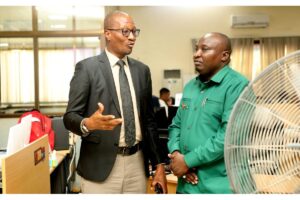Analysts are optimistic that Tanzania stands to gain significantly from its relationship with China following the Forum on China-Africa Cooperation (FOCAC) in Beijing, recently.
However, they emphasise the need for the country to enhance its production of value-added products and develop a skilled workforce to meet market demands.
According to experts, a skilled local workforce is crucial for managing major development projects, such as the Tanzania-Zambia Railway (TAZARA), in collaboration with Chinese experts.
Their comments come in the wake of FOCAC, where President Samia Suluhu Hassan, Chinese President Xi Jinping and Zambia’s President Hakainde Hichilema signed a Memorandum of Understanding (MoU) for the renovation of TAZARA, aimed at accelerating trade and regional integration.
Significantly, President Xi pledged over 50 billion US dollars (about 136tri/-) in aid and loans to support Africa’s modernisation efforts, including infrastructure and agricultural upgrades over the next three years. This commitment is in addition to China’s zero-tariff policy designed to boost trade volume with the continent.
During her week-long visit to Beijing, President Samia met with leading Chinese tech companies, including the China Academy of Space Corporation (CASC), China Electronics Corporation, Transsion Group, Weihua Group, China Railway Construction Corporation (CRCC) and Acme Consultant Engineers PTE Limited and invited them to invest in Tanzania.
Economic Diplomacy Expert Professor Kitojo Wetengere of the University of Arusha believes Tanzania can leverage China’s 1.4 billion population by exporting value-added products such as coffee and avocados.
He argues that exporting value-added crops will enable local producers to earn higher profits and create job opportunities at home, compared to trading raw goods, which are less profitable.
“We need the Chinese market, but to serve it effectively, we must produce enough value-added products,” Prof Wetengere said.
He praised the government’s commitment to attracting Chinese investment and urged for the introduction of relevant technologies in areas like irrigation and solar power. He also called for contracts with Chinese firms to adhere to a win-win principle.
International Relations Analyst Mr Medard Wilfred, who also serves as the Public Relations and Marketing Officer at the Saint Augustine University of Tanzania (SAUT), commended President Samia for securing the infrastructure deal with China for TAZARA’s renovation.
He noted that the upgraded railway would enhance trade between Tanzania and Zambia and stimulate operations at the Dar es Salaam Port, benefiting both short-term and long-term regional trade.
Mr Wilfred urged the Ministry of State, Prime Minister’s Office (Labour, Youth, Employment and Persons with Disabilities) to collaborate with universities to create a database of the Tanzanian workforce and their specific skills, such as software development, to assist Chinese tech investors in finding local employees.
He anticipates an increase in Foreign Direct Investment (FDIs) from China, particularly in the manufacturing sector, due to the promotion efforts by President Samia.
Economist Professor Humphrey Moshi, the Founding Director of the Centre for Chinese Studies at the University of Dar es Salaam (UDSM), highlighted the importance of modernising Tanzania’s agriculture from rain-fed to irrigated farming with China’s support.
He noted that Tanzania, with its abundant water bodies, could easily transition to irrigation if assisted by China’s technology. He emphasised that agricultural modernisation will boost industrialisation and food security, and he advocated for the industrial sector’s contribution to GDP to reach at least 25 per cent from the current 8 per cent.
Professor Moshi expressed eagerness to see China introduce its latest railway technology to TAZARA, reflecting on the significant advancements since the railway’s initial construction in 1975.
He also proposed building the Karume-Nyerere Bridge as a new monument of friendship between Tanzania and China.
Business Expert Dr Sylvester Jotta from Mwanza told the ‘Daily News’ that the forum could significantly boost Tanzania’s exports to China by promoting agricultural modernisation and agro-value addition.
ALSO READ: FOCAC summit writes more splendid chapters of China-Africa relations
He highlighted that President Samia’s visit addressed the trade deficit and offered a chance to strategise new trade paths based on comparative advantages.
Currently, China’s exports to Tanzania exceed Tanzania’s exports to China, despite China being a leading trading partner for Tanzania.
China Exports to Tanzania was 8.09 billion US dollars during 2023, while Tanzania exports to China was 427.89 million US dollars during 2023, according to the United Nations COMTRADE database on international trade.
Economist and Investment Banker Dr Hildebrand Shayo noted that since its inception in 2000, FOCAC has been a cornerstone of Africa-China relations.
He anticipates that the forum will continue to foster mutually beneficial and sustainable cooperation in modernising agriculture, industrialisation and revitalising transport infrastructure.
Source: allafrica.com














